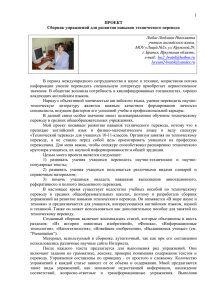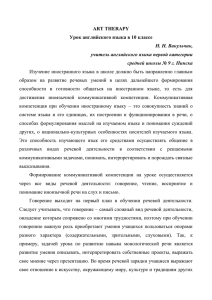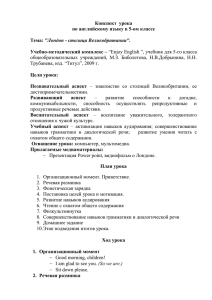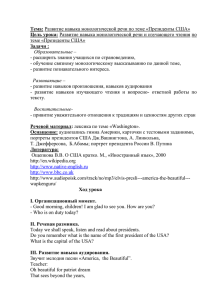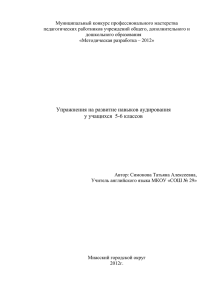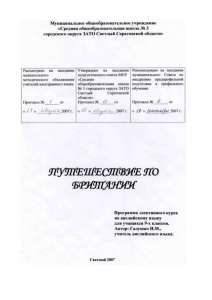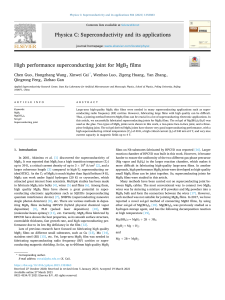Элективный курс по ЕГЭ
реклама
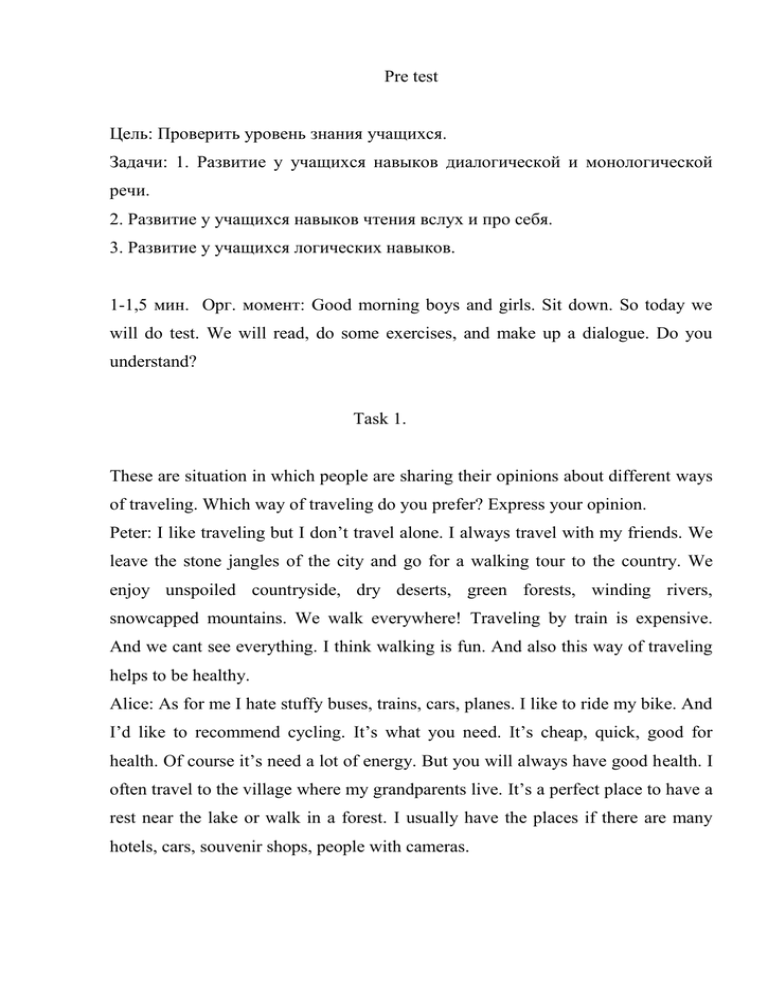
Pre test Цель: Проверить уровень знания учащихся. Задачи: 1. Развитие у учащихся навыков диалогической и монологической речи. 2. Развитие у учащихся навыков чтения вслух и про себя. 3. Развитие у учащихся логических навыков. 1-1,5 мин. Орг. момент: Good morning boys and girls. Sit down. So today we will do test. We will read, do some exercises, and make up a dialogue. Do you understand? Task 1. These are situation in which people are sharing their opinions about different ways of traveling. Which way of traveling do you prefer? Express your opinion. Peter: I like traveling but I don’t travel alone. I always travel with my friends. We leave the stone jangles of the city and go for a walking tour to the country. We enjoy unspoiled countryside, dry deserts, green forests, winding rivers, snowcapped mountains. We walk everywhere! Traveling by train is expensive. And we cant see everything. I think walking is fun. And also this way of traveling helps to be healthy. Alice: As for me I hate stuffy buses, trains, cars, planes. I like to ride my bike. And I’d like to recommend cycling. It’s what you need. It’s cheap, quick, good for health. Of course it’s need a lot of energy. But you will always have good health. I often travel to the village where my grandparents live. It’s a perfect place to have a rest near the lake or walk in a forest. I usually have the places if there are many hotels, cars, souvenir shops, people with cameras. Task 2 Диалог с целью обмена оценочной информацией. Your classmate has a birthday soon, so his friends agreed to give him a surprise birthday party. Discuss with your friend where to organize it. You can choose from: - your home - your friends place - a café - a disco club Remember to: - discuss all the points - explain the situation - come up with ideas - give good reasons - find out your friend’s attitude and take them into account. These are your ideas about each opinion: ____ Your home. - I think its better to celebrate his birthday at his place rather then at your place - It may be inconvenient for your parents - I guess it may be difficult to invite our friend to visit you on + - You know, it’s a wonderful idea. We will be able to prepare everything in secret. - I like the idea of organizing our dinner party ourself - We shouldn’t miss the opportunity to see his surprised face his birthday Your friend’s place. - It may be difficult to organize the party at his place without his learning about it - It sounds terrific! It will be fun to prepare the surprise secretly at his place - I like preparing the decorations - What if he guesses about the surprise? and music - We may enjoy bringing each a home-made dish Café - We may enjoy easy and friendly - To be honest I don’t plan environment of the place. It is a spending much money good way to relax - Café may be crowded and it is - Why don’t we order some cake non fun to have many people and tea and fruits - We haven’t been to this new café around - You know I just hate eating out in our district. I think it would be interesting to see what its like there Disco club - I like the atmosphere there, its so - I don’t feel like dancing exciting - I would rather have a quite talk in café - We may try new soft drinks - What about organizing a dress-up - The music is usually too loud and it is noisy. I am afraid we won’t party? It’s a wonderful chance to dance and play games be able to relax Task 3 Прослушайте короткие диалоги и выберете ответ, наиболее близкий по смыслу. 1 – Would you like a coke or some mineral water? - I like them both but I‘d rather have something hot. What does the man want to drink? A. Both mineral water and coke B. Something hot C. Some coke 2 - Could you tell me if the London train will be arriving on time? - Yes, sir. It will be arriving in about half an hour at platform 1. Where does the dialogue take place? A. In London B. In the airport C. At the railway station 3 – Let’s go to the computer club at our school on Monday - I like to but I’m doing a part-time job that day. What is she going to do on Monday? A. Do baby-sitting B. Stay at home C. Go to the computer club 4 – Where are you living now? Jack told me you have moved to somewhere. - I’m living in the center now. Its not far from my school. Where did the girl live before she moved? A. Far away from school B. In the center C. In another country 5 – Mr. Brown bought some textbooks on Math, ballpoint pens and pencils. - I think he will use them at school. What does Mr. Brown do at school? A. He studies Math at school B. He teaches Math C. He likes to read books on Math 6 – I must go to my classes because we have a test today. But if I could I’d go to the cinema with you. - It’s a pity. I wish we could go there together. Where is the student going? A. To the cinema B. To the café C. To school 7 – Now, what is the trouble Mr. Smith? - I was having a terrible cough this night and some chest pain. What are these two people? A. A husband and a wife B. A patient and a doctor C. A teacher and a student 8 – Oh, its six o’clock already and I haven’t finished my home work yet. - Never mind. The clock is ten minutes fast. What’s the time? A. It’s 6 o’clock B. It’s 10 to 6 C. It’s 10 after 6 9 – Hello Mr. Jackson. This is Nick Hopkins’s friend. I’m calling to tell you that he will come to your place today at 6.30. - Thanks for calling. I’ll meet him downstairs. Whose friend is calling? A. Mr. Jackson’s B. Mr. Hopkins’s C. Today at 6.30 10 – It is better to wait for tomorrow. Don’t you think so too? - Yes, I couldn’t but agree What does he think about it? A. It’s better to go tomorrow B. He agrees to go there now C. He doesn’t agree to go there Keys: 1B, 2C, 3A, 4A, 5C, 6C, 7B, 8B, 9B, 10A. Упражнение VI Прослушайте диалог новобрачных. В бланке ответов впишите слово или фразу, дополняющую начатое высказывание, согласно содержанию диалога. Помните, что, работая с бланком, вы будете ограничены во времени. Him: So, you don't want to go out, then? Her: No, I don't. Him: Wouldn't you like to go to a disco or something? Her: No, I wouldn't. Him: Well, what would you like to do? Her: I'd like to do something exciting like flying to Palm Beach! Him: Oh! I see. Her: Yes, I'd love to have lots of money, enjoy myself and have a good time. Him: Anything else? Her: Yes, I want to be a wife of a millionaire. Him: Well, that's one thing I've no desire to be. Her: I know. That's why I've no wish to go out with you. (repeated twice) Continue the sentences: She doesn't want... She wants to do something... * She would like to get to Palm Beach by... She dreams of having... He's got no desire of becoming... They continued to quarrel... Keys (ex. VI) 1 — to go out 2 — exciting 3 — plane 4 — (lots of) money 5 — rich (millionaire) 6 — again План-конспект 2-х уроков английского языка (Говорение) Класс: 11 Тема: Leisure- time. Theater. Cinema. Цели: - активизация тематической лексики УМК в устной речи учащихся в диалогической речи и монологической форме в процессе развития иноязычной коммуникативной компетенции школьников; - расширение знаний старшеклассников об истории развития кинематографии англоязычных стран и России; - развитие умений и навыков учащихся средствами изучаемого иностранного языка выражать свое отношение к театральной жизни, просмотренным фильмам и различным жанрам киноискусств; - активизация употребления придаточных определительных предложений в речи учащихся; - приобщение учащихся к высотам театрального искусства и киноискусства как одной из активных форм проведения свободного времени с пользой; Формы проведения: - интерактивная беседа - обмен мнениями Учебное пособие: УМК В.Л. Кузовлева для 10-11 классов Unit 6. План урока: 1. Орг. момент 2. речевая зарядка 3. интерактивная беседа 4. письменное задание. Текст 5. этап говорения 6. тест 7. подведение итогов Ход урока: 1. Орг. момент Good morning boys and girls. Today we will have 2 lessons. Well the problem under discussion at our English lessons is “Student’s Leisure Time and the best ways to spend it wisely”. It is natural that studying at school is your main work now. More over this mental work of your requires much time and of course strength which needs to be restored later. So deep in heart everybody I think always wants to have more free time to have a good rest. But what is the best way to spend it wisely? I suppose it won’t take you much time to answer this question. The key words of Card 1 you are aware of course also give you brought to elaborate upon the idea. Will you scan them? 2. Речевая зарядка (фронтальная беседа, управляемый диалог, диалог учащихся) Карточка 1 LEISURE-TIME - to do one's best to spend free time wisely * a lot of opportunities of spending free time * to choose the one you need - to go for a walk and breathe in fresh air - to walk along the streets and to enjoy the beauty of the city's archi tecture - to be interested in many leisure-time activities - a lot of ways of spending free time - to prefer or to be fond of (reading, listening to music, collecting stamps or coins, playing chess, etc.) - to be the best way of expressing feelings and thoughts (fiction lit erature) - to go in for sports - to play an important part in people's life -to take aerobic classes to keep fit -to take up (roller-skating, horse-riding, parachute-jumping, mountain skiing, etc.) - to be wide (the range of one's hobbies) - to listen to favorite music - to learn to play musical instruments - to be extremely fond of dancing - to attend rap-discos - to take photographs (to catch a person in a moment of action or feeling) - to be fond of painting - to understand the beauty and harmony of the surrounding world - to express one's own emotions and feelings - to visit museums or art galleries - to visit the theatre - to get the ticket in advance - to enjoy the theatrical performances - to be the most available popular form of art (cinema) - to be one of the best ways to spend free time 2. Интерактивная беседа. T: I see. And I want you now to join our conversation concerning theater and cinema. Tastes differ of course and there are many different opinions about theatrical performances. All of you I believe enjoy many of them don’t you? If it is really so you cant help expressing your positive attitude towards them. The only thing for you however is to find the words needed, isn’t it? But if unfortunately you happen to dislike some of them you may express your negative feelings as well. How would you do it in English? Let us try to and in this way you will be able to practice your English again to improve it. Scan the key words at Card 2 and Card 3, find the necessary word combinations and sustain the conversation expressing your like or dislike, will you? Ask pupil P1 what he is extremely interested to see at the theater and why. Do you advice to go to the theater and see comedies or other plays too? Карточка 2 HOW DO YOU FEEL ABOUT DIFFERENT THEATRICAL PERFORMANCES? Theatre - to feel like going to the theatre; to be involved in the action of the play; to forget that you are watching a play; to put somebody in a joyful mood; to prefer. Opera music - marvelous, exciting, magnificent; great; to be complicated; to be dull; to be too serious; to be sometimes difficult to find one's own way in it. Ballet - to watch ballet performances with pleasure; to make people understand the beauty of a human body; to be the most exciting thing in the world; to make a great and unforgettable impression; be boring. Operetta - to be cheerful, magnificent, splendid; to teach sincerity and make people happy; to be lightminded. Карточка 3 SPEECH PATTERNS to express positive or negative feelings towards theatrical performances 1. I really enjoy watching ... 2. I'm fascinated by ... 3. I'm extremely interested in ... 4.1 don't much like ... 5. I'm really bored by ... 6. I've always wanted to learn something new about ... 7. I really feel like seeing (visiting; going to...) ... again. 8. You would enjoy ... very much. 9. You are sure to be pleased with ... 10. It won't make you be passive or indifferent. 11. It will make you unhappy (nervous; bored; yawn). 12.1 couldn't help laughing (crying; yawning; smiling) IV. Этап говорения And now let’s go on speaking. You were asked to say a few words about the film genres you prefer. What are they? Try to give your reasons too. Who is eager to start a conversation? Will you use so me of the expressions from card 4 and say a few words about this film genre to show how you personally understand them. What about comedies and love stories? What other film genres do you want to speak about? All right. But there are some other film genres to speak about. And modern television programs, other TV reviews a great variety of film genres nowadays. Does anybody like any of them? Join the conversation and elaborate upon the idea, will you? Карточка 4 FILM GENRES Test Read the names of film genres and match them with their descriptions 1 - Historical films a - Blood, screams, monsters, vampires, maniacs and knives are typical of these films. b - Real facts of the events of the past without film stars are presented by these films 2 - Detectives before the audience. 3 - Westerns 4 - Action films с - are usually unrealistic as they are about unreal or supernatural things and are stuffed with events and have a mysterious plot. 5 - Love stories 6 - Comedies 7- d — are films with a mysterious plot and people always try to guess who are criminals in the film. Mysteries and clues are typical of these films. Thrillers realistic, truly reflect the past and teach you to defend justice. Wars and heroes 8 - Documentaries eare- are typical of these films. 9 - Science fiction f- always keep the audience in suspense. films 10 - Melodramas g - Cowboys, guns, shots, saloons and prairies are typical of these films. 11 -Cartoons h - are always full of tears and are said to be romances for girls. 12 - Adventure i - are films with painted personages for children as a rule. films I j - are said to have a simple story line but touching. Love, faraway lands and horses are 13 - Musicals typical of these films. 14 - Horror films к - Love, sorrow and relationship are typical of such films. I - are funny and make people smile and laugh. Jokes and sometimes silly situations are 15 - Tragedies typical of such films. m - are usually full of fights and adventures. Chase, fights and guns are typical of these films. n - are sometimes too dramatic and usually everybody dies at the end. о - are said to have a funny plot with a lot of music. VII. Подведение итогов. Оценки, комментарии. Окончание урока. План-конспект 2-х уроков английского языка в 11 классе Тема: Music Цели: 1. Развитие и совершенствование у учащихся умений, которые обеспечивают иноязычное общение как с одним собеседником, так и с целой группой. 2. Ознакомить учащихся с музыкой Британии в 60-е годы 3. Развитие умений и навыков, учащихся средствами изучаемого языка выражать свое отношение к музыке План урока: 1. Орг. момент 2. Речевая зарядка 3. Работа с текстом 4. Заполнение пробелов 5. Работа в парах. Интервью 6. Чтение текста 7. Интерактивная беседа 1. Орг. момент Good afternoon dear pupils. Our theme of the lesson is Music. Today we are going to look at British pop music from its rise in the early with the Beatles throughout to some more recent bands. 2. Речевая зарядка 1. Do you like to listen to the music? 2. What kind of music do you like? 3. Do you have favorite singers or groups? 4. What kind of music do you know? 5. Would you like to be a singer? 6. Can you sing? 7. What more favorite groups do you know? 8. What about British singers? 9. Have you ever listened about Beatles? 10.Have you ever listen to their music? 3. Работа с текстом Now children I give you the text about the Beatles. Read it to yourself after we will read, translate and discus it. After that you will answer to some question. The Beatles The Beatles were the most popular band at the 60-s. the four members John Lennon, Paul McCartney, George Morrison and Ringo Star were all born in Liverpool, England. Their first record “Love Me Do” come out on 5-th October, 1962. By 1964 The Beatles were famous all over the world. Everywhere they went, thousands of fans followed them. In 1965 The Beatles performed at Shea Stadium in New York to a crowed of 55,000 screaming fans. It was the largest line concert in history. The Beatles gave their last performance on 30-th January, 1969, on top of the Apple building in London. In 1970 the band decided to split up. Paul made a new band called ”Wings”, John’s new band was called “The plastic Ono Band”. Both Ringo and George followed solo careers. John Lennon died in 1980. one of his fans shot him outside his home in New York. In the end the Beatles became legend. Their music touched many people’s hearts and even today they still have millions of fans all over the world. Let’s read and translate one by one. Now let’s answer to the questions. 1. Who were the four members of the Beatles? 2. What happened to John Lennon? 3. What was their first sing? 4. When did they split up? 5. What is happened with Paul? 6. Who wrote “Candle in the wind”? Now ask each other your questions. 4. Заполнение пробелов 1стр. Read and put the right prepositions. Elton John was one ______ the biggest pop superstar of the 70s. He was born in 1947 and was called Regina Kennebn . He changed his name _______ Elton John in 1966. He could play the piano when he was four. When he was eleven he went to the Royal Academy of Music. He joined_______ his first band “Bluesology” in 1961. He gave his first American concert_______ August 1970, in Los Angeles. _______ 1972 and 1976 Elton John had sixteen top 20 hits including “Rocket man”, “Crocodile Rock” and “Daniel”. He wrote “Candle in the wind” in 1973 and rewrote it in 1997 when Princess Diana died. Elton John also wrote songs _______ “The lion king” in 1994. Elton John’s songs are still very popular today. He is one of the richest singers in the world. He is famous ________ the colored costumes he wears________stage. Key: of,to,---,in---between---, for,for,on. 5. Интервью Now work in pairs. Prepare for the interview. Are you going to interview a student who plays a role of famous pop superstar. You wants to find out how much he\she enjoys their music. Prepare your questions. 6. Now let’s work with the text about Elton John. Listen to my sentences and continue them. 1. Elton John was one _______ 2. He was born in______ 3. The could play when ______ 4. He gave his first American concert _______ 5. He had 16 Top 20 including _______ 6. Elton John also wrote songs _________ 7. His songs are still _______ 8. He is one of the richest singers _______ 7. Now let’s discuss about music in whole. Think a bit and tell us about opinions. You can use this Card 1. - to be impossible to live without - to be enjoy doing smth. - to be interested in smth. - to play different instruments - many styles of music - a lot of groups and fun clubs - to arrange concerts in - to visit concerts - to be fond of classical music - to attend a music school - to like to listen to - to prefer to listen - to relax and enjoy smth - to have free time 9. Подведение итогов. So our lesson is over. Your marks. Your home task. План-конспект 2-х уроков английского языка в 11 классе. Тема: English is a new means of communication. Цели: - активизация тематической лексики УМК в устной речи учащихся в диалогической и монологической форме в процессе развития иноязычной коммуникативной компетенции школьников; - приобщение учащихся к добросовестному изучению иностранного языка не только как школьного учебного предмета, а прежде всего как нового важнейшего средства общения; - воспитание положительного толерантного отношения к английскому языку как средству общения народов стран другой культуры - проводя межпредметные связи показать, что каждый народ имеет свои заслуги перед человечеством и достоин уважения. План урока: 1. орг. момент 2. фон. зарядка 3. чтение текста 4. работа с карт. 5. интерактивная беседа 6. тест №1 7. чтение 8. тест №2 9. подведение итогов 1. Орг. момент Well boys and girls our today’s English lessons aren’t going to be on exception. We shall try to deepen your knowledge of the problem under discussion and this will also help you to improve your English. So I want you all to take an active part in the discussion and try to acquire the information needed. As usual our keyword Cards will help you to sustain the conversation. 2. Фон. зарядка Before that let’s practice reading and pronouncing some of the English words and expressions you will have to use. Have a look at Card 1 and read them one by one than after me in chorus. Card 1 - foreign languages - a mean of communication - to be of great importance - nowadays - to be socially demanded - science and technology - an exposition of knowledge - an overflow of information - the most efficient means - information exchange - to develop friendship - understanding among people - the most widespread language - a mother tongue - the native speaker - the official language of - to be very useful - to master foreign languages - to require time and effort - to have a good command of - to work hard 3. Чтение текста Good, now read the text attentively and join the conversation. Карточка 2 (учащимся не выдается) FOREIGN LANGUAGES IN PEOPLE'S LIFE "What foreign language is good at?" - with these words begins the conversation between two people that speak various languages and feel like trying to find a common means of communication. Everybody knows that people have been learning foreign languages for thousands of years. But nowadays this problem seems to be of greater importance. Foreign languages are socially demanded especially at the present time when the progress in science and technology has lead to an explosion of knowledge and has contributed to an overflow of information. The total knowledge of mankind is known to double every seven years. Foreign languages are needed as the main and the most efficient means of information exchange of the peoples of our planet. People of different countries and nations have to get along well with the progress in the world trade and technology as well as with each other. So it is very useful to learn foreign languages. Knowledge of foreign languages helps us to develop friendship and understanding among people. As for English, it is the most widespread language in the world. It is very popular all over the world and approximately 400 million people speak it as a mother tongue. The native speakers of English live in Great Britain, Australia, New Zealand, Canada, and the United States of America. English is the language of computers, science, technology, business, politics, and sports. English is one of the official languages of the United Nations Organization. It is the language of literature, education, modern music and international tourism. Speaking a foreign language, you can read newspapers, magazines and original books by great writers, watch satellite TV programmes. Besides you can talk to people of any nationality and can get the necessary information anywhere in the world. If you enjoy traveling you can go anywhere without being afraid that other people won't understand you. So more and more people are trying to master English or any other foreign language. This work is known to require much time and effort. But if you want to have a good command of English you will have to work hard to acquire a new means of communication. 4. Работа с картой Well you have read the text and we may start the conversation. Consult the vocabulary Card 3 and try to organize a general discussion of the problem of the lesson according to what you have read it. Your task is to ask and answer some questions on the text. Only be attentive to the words in the questions which are presented in the Card in disorder. This work is familiar to you and I suppose you will be able to manage it. You may begin. Ask questions and speak about the role of foreign languages in people’s life according to the text. 1. What, want, to have, do people, usually, of different nation? (a common means of communication) 2. What, nowadays, problem, of greater importance, is? (learning foreign languages) 3. Why, socially demanded, at the present time, foreign languages are? (the progress in science and technology; to lead to an exposition of knowledge; to contribute to an overflow of information) 4. Why, the mean and, the most efficient means, foreign languages, needed, as, are, of information exchange? ( the total knowledge of mankind; to double every seven years) 5. Why else, important and useful, foreign languages, is, it, so, to learn? (to develop friendship and understanding among people) 6. How many, a mother tongue, speak English, as, people of the world? (approximately 400 million people) 7. What countries, do, of the English language, the native speakers, live in, mainly? (Great Britain, Australia, New Zealand, Canada and the USA) 5. Интерактивная беседа And now we are going to share into two groups. One group is against learning foreign languages and the second group finds that it is right to learn foreign languages. You must prove your opinions. You can use card 4 and card 5. Карточка 4 YOU DON'T WANT TO LEARN FOREIGN LANGUAGES, DO YOU? WHY? 1 - to be a waste of time 2 - to contain a great many of other subjects (the school curriculum) 3 - to require much time and effort 4 - to be always nervous because of shortage of time 5 - to be of no (little) use in our everyday life 6 - to learn by heart a lot 7 - to work hard to be good at 8 - to do a lot of tests; to have no idea how 9 - to be boring and annoying 10- to lack natural opportunities to communicate with native speakers 11- to have brilliant opportunities to find the necessary information in Russian books 12- to find the required information in the Internet (due to computers) 13- to be good at computers 14- to do without foreign languages 15- to acquire a good command of foreign languages one has to... - to learn a lot of words and expressions - to have the largest vocabulary in the world (English: about 500,000 words and 300,000 technical terms) - to overcome a lot of problems with English spelling and pronunciation - to master the English transcription and to learn how to spell and read English words correctly - a great many exceptions to every rule - to learn to think in English (impossible) - to bear in mind all the particularities of the British and American English Карточка 5 YOU WANT TO LEARN FOREIGN LANGUAGES, DON'T YOU? WHY? 1 - to have one more means of communication 2 - to have wide opportunities to communicate with people from other countries of the world 3 - to study well at a university 4 - to get a well-paid job in the future life 5 - to travel to English-speaking countries without being afraid that other people will not understand you 6 - to master foreign languages in order to learn more about our own mother tongue 7 - to learn and understand well the culture and numerous traditions of other nations, Englishmen among them 8 - to develop friendship and understanding among people of different nations all over the world 9 - to have rich opportunities to read books by great writers in the original 10- to get more information while reading newspapers and magazines of other countries 11- to master the language of computers better 12- to learn more about science, technology, politics, business, sports and other useful every day activities of people 13- to try to help to get along well with the progress in the world trade and technology 14- to become a well-educated personality 6. Подведение итогов. Оценки. Комментарии к ним. Окончание урока. План-конспект 2-х уроков английского языка в 11 классе Тема: Teenagers’ problems Цели: - активизация тематической лексики УМК в устной речи учащихся в диалогической и монологической форме в процессе развития иноязычной коммуникативной компетенции школьников; - развитие умений и навыков учащихся аргументировано выражать личное отношение к проблеме, предлагая собственные пути её решения; - развитие навыков школьного самоуправления и формирование умений совместно анализировать и давать оценку поступкам, коллективно находить оптимальные пути решения проблемы; - воспитание потребности в здоровом образе жизни. Формы проведения: интерактивная беседа, ролевая игра. План урока: 1. орг. момент 2. фон. зарядка 3. интерактивная беседа 4. говорение 5. ролевая игра 6. подведение итогов 1. Орг. момент Well boys and girls, all of you I believe feel like speaking English, don’t you? So let’s begin our today’s lessons. Today we are going to discuss teenagers’ problems. And while discussing the problems touched upon our task was to enrich your vocabulary by means by means of the words and expressions presented in the key words in cards you have been given. 2. Фон. зарядка At first lets read lets read these words and expressions after me than in chorus. Карточка 1 What do teenagers sometimes complain about? 1 - going to school 7 - being treated like babies 2 - having a younger brother 8 - choosing a career 3 - buying transport tickets 9-getting a job 4 - having not enough money 10- watching violent films 11- joining the army 5 - dealing with parents 6 - continuing education 12 – being young 3. Интерактивная беседа Very good. Thank you. But I would like the others to touch upon some other problems many young people worry about. The words of Card 2 will suggest you 10- watching violent films thought. Do please. 11-joining the army 12-beingyoung Карточка 2 What do young people worry about? 6 - aggressiveness 1 - family problems 7 - poverty 2 - personal problems 8 - cruelty 3 - school problems 9 -drinking problems 4 - discrimination 10-drug addiction 5 - violence Problems: serious, important, awful, urgent, shocking; difficult to solve, interesting to discuss, useless to speak about 4. Говорение. Монологическая речь. And now I’d like to here your own points of view upon the problem “Teenagers’ life ambitions: what do they want?” For these you may use words and expressions of Card 3 that are sure to help you to express your opinion upon this important problem. Карточка 3 Teenagers' Life Ambitions. What Do They Want? 1 - to be independent - быть независимым 2 - to be taken seriously - относиться серьезно 3 - to do well at school - хорошо успевать в школе 4 - to be treated with respect - быть уважаемым 5 - to have the guaranteed rights to education, work and rest - иметь гарантированные права на образование, труд и отдых 6 - to have a chance to express one's own individuality - иметь возможность выражать свою собственную индивидуальность 7 - to try to change the world to the best - пытаться изменить мир к лучшему 8 - to rebel against the society - восстать против общества 9 - to reject everything - отвергать всё 10- to enjoy life - наслаждаться жизнью 11- to earn enough money - заработать достаточно денег 12- to make one's own mistakes and try to overcome all the life problems oneself - совершать свои собственные ошибки и пытаться преодолеть все жизненные проблемы самому 13- to want the adults to be tolerant and patient - хотеть, чтобы взрослые были терпимыми и терпеливыми 14- to try to help in solving each others' problems - пытаться помочь в решении проблем друг друга 15- to make oneself useful in life - приносить пользу в жизни 5. Ролевая игра All right. Your point of view is quite clear. And now let us try to learn how to cope with some of teenagers’ problems. First however we must divide the class into groups and all of you will have an opportunity to muster your English in a usual way. I want you to imagine you are the participants of such a Court too. Teen Court is a role play which will also give you an opportunity to practice speaking English. Some of you will be plaintiffs; some other will be defendants, teachers, parents and judge of course. If you do not object to let P1, P2 and P3 be the judges of our Teen Court, let them come out to the front, take the sits at the judge’s table and appoint the Senior judge of the Court. Карточка 5 THE JUDGES' WORK Imagine you are a judge in the Teen Court. Use the expressions below to explain your work as a judge and ask the defendants questions 1 - to be a judge is not easy; 2 - to discuss the rule that has been bro ken (Use: We should); 3 - to discuss how justice can be fairly applied; 4 - to listen to the plaintiffs and the defendants attentively; 5 - to take notes while listening to understand the problem thoroughly; 6 - to ask the plaintiffs any questions needed; 7 - to appoint the Senior Judge; 8 - to be caught (smoking, drinking alcohol, taking drugs) (Ask: a) Is it true that you...? b) When...? c) Who...with?); 9 - to be forbidden (Ask: Do you know that...?); 10 - to complain to Teen Court (Ask: Do you know that the teachers...?); 11 - to agree to the complaint (Ask: Do you...?); 12 - to disagree to the complaint (Ask: Why do you...? Give reasons.); 13 - to smoke, to drink alcohol, to take drugs (Ask: a) Do you...regularly? b) Why...? c) Give reasons.) Карточка 6 THE SENIOR JUDGE'S WORK Imagine you are the Senior Judge. Use the expressions below to lead the discussion in the Court. 1 - We should have our Court case today. 2 -We have to talk how we're going to run the Court. 3 - I have to open Teen Court first and introduce the plaintiffs, the defendants and the judges. 4 - to ask the plaintiffs to explain their complaint; 5 - to ask the defendants to respond to the plaintiffs' complaint; 6 to ask the judges to come out with their questions; 7 - to organize a general discussion of the case and the problem touched upon; 8 - to make the teachers and the defendants' parents take part in the discussion and explain the defendants how harmful their behavior is; 9 - to ask the defendants for the final word; 10 - to ask the judges for the final decision Карточка 9 Imagine you arc a teacher or a parent. Use the expressions below to ask the students questions about their bad habits. (Ex. 2, p. 136) 1 - to be not allowed anywhere in school (smoking, drinking alcohol, taking drugs) Ask: Do you know that...? 2 - to cause various diseases Ask: a) Do you know that... ? b) What diseases...? 3 - smoking: to make teeth yellow, hair and clothes smell; to cause a cough, a headache, cancer 4 - drinking alcohol: to make speech unclear; to cause slow reactions, loss of memory and a headache 5 - to affect your social controls, your future children and people around you Ask: Are you aware of the fact that...? 6 - taking drugs: to make brain centers sleep; to cause blood and heart diseases, brain disease 7 - to be harmful for teenagers 8- to be strong and healthy Ask: Do you want...? 9- to keep healthy lifestyle Ask: What lifestyle...? 10 - to say smth as a final word Ask: What would you say...? 6. Окончание урока. Выставление оценок. Комментарии к ним. Тема: Итоговый тест. Цель: Проверить уровень знания учащихся. Задачи: 1. Развитие у учащихся навыков диалогической и монологической речи. 2. Развитие у учащихся навыки восприятия речи на слух. 3. Развитие у учащихся навыки грамматически правильного построения предложений. 4. Развитие у учащихся навыки грамматически правильного построения высказывания. 5. Проверить уровень знания у учащихся. Ход урока. 1. Организационный момент: Good-morning, boys and girls! Sit down, please. So today we will have a test about TV and computer. 2. Listen to me very carefully. Appeal to Hollywood. American parents today are deeply worried about their children's exposure to an increasingly toxic popular culture. According to a recent CNN-USA Today-Gallup poll, 76 per cent of adults agree that TV, movies and popular music are negative influences on children Moreover, there is a direct link between our violent and degrating entertainment culture and the horrifying new crimes among our young. Therefore we, the undersigned, callupon executives of the media industry to join with America's parents in a new social compact aimed at renewing our culture and making our media environment more healthy for our children. We appeal to industry leaders in all media to develop a new voluntary code of conduct. The code we envision would: 1. state the industry's vital responsibilities for the health of our culture; 2. establish certain minimum standarts for violent, sexual and degrading material; 3. forbid the practice of selling adult-oriented programmes to youth markets; 4. make the industry develop good family-oriented entertainment. We strongly urgue parents to express their support for a new voluntary code of conduct by signing this Appeal. There are now over 10000 signatories to the Appeal. 1)And now make up the dialogue about TV. 2)Listen to my questions about the text: a)According to the writer of the appeal, who is responsible for the dealing with violence on TV? b)Why is it important that the code of conduct should be volutary? c)Does the code should easy to implement? d)In this an effective way to deal with TV violence? Why?/Why not? e)What is purpose of the text? f)What language features are used in the text? g)Do you think violent programmes on TV should be forbidden? 3. Now the second text about computers. Listen to me very carefully. Do you prefer to read a book or use a computer? Do you think that a book is too heavy to carry? Are you a person from the Internet era? Every day, these ideas go through my mind. Many years ago, Marshall Mcluhan who was a communication theoretician predicted that, in the future, humans will prefer computers to printed books. He defined computers as extensions of the human nervous system; and he thought that they will allow people to reach every part of the world, in only a few minutes or seconds. He was right, but he never saw the accomplishment of his prediction, because he died in 1980. After thinking and re-thinking, I understood the rael importance of the electronic era. However, I started to think about the new role of printed books. I am sure that, in the future, they will not disappear. Their new mission might be to rest on the shelves of our personal libraries or offices, waiting until someone looks at them and decides to enjoy reading. Currently, many books appear on the Internet, and you see the very first editions of some of them, I saw the first edition on-line of “Don Quixote de la Mancha”, written by a Spanish author, Miguel de Cervantes. When I was a child my grandfather read me this book. It tells the story of an old man, who used to read a lot of books, he became crazy, and he decided to be an errant knight. When I think of this story, I can remember my hands touching the book's pages, my eyes seeing its original illustrations, my ears listening to my grandfather's voice, and my nose smelling the ink of its pages. However, now I am in front of a computer, reading some parts of the book and informing myself about new and different sites that help me know more about the author and the structure of this masterpiece. The electronic era has changed my relationship with books. If Cervantes was alive, he might write a different novel using the idea of books on-line. Can you imagine Don Quixote reading his books on-line? I can not help thinking about the enormous difference that the story would have! New technologies are capable of introducing changes in our daily lives, but books on-line can never complete with humans' personal relationship with printed books. Have you already forgotten your childhood when mom or dad sat beside your bed and read you a bedtime story? I do not think so! 1) And now make up the dialogue about computer. Give your attitude. 2) And now listen to my questions: a)According to Irma, what is more likely to happen? How do you know? b)Can you explain the difference between a printed book and a book on-line? c)What word(s) can replace are capable of? 4. Окончание Комментарии. урока. Выставление оценок, подведение итогов.
